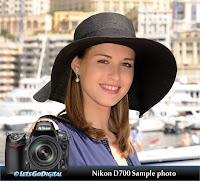Bali's Guardian Uluwatu Photo by RIA Novosti, Mikhail Tsyganov
Saman Dance. Aceh. Photo by: Taufik Istiqlal
The Colour of Balinesse Dancer. Photo by: Taufik Istiqlal
2008-10-28
Indonesia
2008-08-22
Nikon D700
 The imaging side of the D700 is pretty much the same as the D3; it shares the acclaimed 12.1MP full frame ('FX') sensor and has the same processing engine, so we would presume output to be almost identical. The main differences (aside from being considerably smaller) are physical; there's a different shutter (good for 150,000 exposures rather than 300,000 on the D3), different viewfinder prism (with 95% coverage) and a slower burst rate. You also lose the rear LCD info panel (there's no room for it) and one of the D3's two CF card slots, but you do get a couple of extra features to soften the blow slightly; most notably a self-cleaning sensor and a built-in flash. We'll look a little more in-depth at the differences between the D3 and D700 in a moment.The D700 joins the D3 as a fully-fledged 'professional' model; it has the same tank-like build quality (though we're sure the pop-up flash will cause a few raised eyebrows), and gets you the full pro service from Nikon. And the pricing (around $2999) reflects this; anyone hoping for an 'affordable' semi-pro full frame Nikon SLR will have to wait until the cost of producing such large sensors falls considerably.
The imaging side of the D700 is pretty much the same as the D3; it shares the acclaimed 12.1MP full frame ('FX') sensor and has the same processing engine, so we would presume output to be almost identical. The main differences (aside from being considerably smaller) are physical; there's a different shutter (good for 150,000 exposures rather than 300,000 on the D3), different viewfinder prism (with 95% coverage) and a slower burst rate. You also lose the rear LCD info panel (there's no room for it) and one of the D3's two CF card slots, but you do get a couple of extra features to soften the blow slightly; most notably a self-cleaning sensor and a built-in flash. We'll look a little more in-depth at the differences between the D3 and D700 in a moment.The D700 joins the D3 as a fully-fledged 'professional' model; it has the same tank-like build quality (though we're sure the pop-up flash will cause a few raised eyebrows), and gets you the full pro service from Nikon. And the pricing (around $2999) reflects this; anyone hoping for an 'affordable' semi-pro full frame Nikon SLR will have to wait until the cost of producing such large sensors falls considerably.






*
Nikon's original 12.1-megapixel FX-format (23.9 x 36mm) CMOS sensor: Teamed with Nikon's exclusive EXPEED digital image processing, the D700 delivers breathtakingly rich image quality.
*
Broad ISO sensitivity up to 6400 and incredibly low noise: Super low-noise performance from 200-6400 ISO, with the added versatility of Lo-1 (100 ISO) Hi-1 (12,800 ISO) and Hi-2 (25,600 ISO).
*
Continuous shooting up to 5 frames per second: Shoot at up to 8 frames per second with the optional MB-D10 Multi-power Battery Pack.
*
Three-Inch, super-density 920,000-dot VGA color monitor: High resolution with
170-degree wide-angle viewing, calibrated color and tempered-glass protection assure confident image review.
*
Two Live View shooting modes: Choose from hand-held or tripod modes to suit shooting requirements.
*
Rugged magnesium-alloy construction: Along with extensive dust and moisture protection and a durable shutter mechanism tested to 150,000 cycles, the D700 merges pro D-SLR performance with expanded agility.
*
Fast, accurate 51-point AF with 3D Focus Tracking: Exacting autofocus precision, plus three Dynamic AF modes.
*
Dynamic Integrated Dust Reduction System: Effective quad-frequency, ultrasonic sensor cleaning minimizes image degrading dust particles.
*
1,005-Pixel 3D Color Matrix Metering II: Legendary Nikon exposure accuracy aided by an onboard database of over 30,000 images.
*
Nikon's exclusive Scene Recognition System: SRS further extends auto-exposure intelligence while also advancing white-balance detection and autofocus performance.
*
Nikon Picture Control settings: Advanced color control with 9 customizable settings and 4 preset options allow fine tuning of image appearance preferences.
*
Active D-Lighting with NEW Auto mode: Unique three-phase dynamic control to capture previously lost details in shadows and highlights while maintaining normalized contrast.





2008-08-07
Marine Marvel
A male peacock mantis shrimp plies the seafloor off Papua New Guinea. These garishly colored crustaceans are favorites of the aquarium trade.
Photograph by Chris Newbert/Minden PicturesThe red-spotted eye of a red Irish lord fish stands out in God's Pocket Marine Provincial Park in British Columbia, Canada. These colorful fish live in the North Pacific and are often found in rocky areas close to shore.
Photograph by Paul NicklenTiny teeth and yellow nostrils flash as a male blue ribbon eel opens wide in the Fiji Islands. The expanded nostrils end with fanlike flourishes, and the tip of the eel's lower jaw terminates with three tentacles. But those are not all of its tricks—the ribbon eel also can abruptly change its sex.
Photograph by Tim LamanMost toadfish wear ornate, fleshy protrusions to blend in with the reefs where they make their home. The three-spined species, shown here in the waters off Western Australia, is among the largest of the toadfish, reaching 12 inches (30 centimeters) long.
Photograph by Fred Bavendam/Minden PicturesLionfish like this one in Papua New Guinea are native to the reefs and rocky crevices of the Indo-Pacific, although they've found their way to warm ocean habitats worldwide. Their wispy dorsal fins contain toxin-filled needles used to dissuade would-be predators.
Photograph by Birgitte Wilms/Minden PicturesFrogfish, also called anglerfish, wear some of the most striking colors and ornate physical adornments in the ocean. Here, a crimson-tinted species rests on a reef near the Solomon Islands.
Photograph by Chris Newbert/Minden PicturesA freckle-face blenny peeks from its reef burrow in the Solomon Islands. Blennies are found throughout the world's ocean, usually in shallow water. Some species are even known to lounge out of the water on rocks.
Photograph by Chris Newbert/Minden PicturesLike a marine Mick Jagger, a rosy-lipped batfish pouts near Costa Rica's Cocos Island. Batfish are poor swimmers, preferring to use their strangely adapted pectoral fins like legs to crawl about the seafloor.
Photograph by Birgitte Wilms/Minden PicturesCrown jellyfish live in all the world's oceans, usually at significant depths. Here, a bright-red specimen samples the shallow waters around Papua New Guinea.
Photograph by Chris Newbert/Minden Pictures
2008-08-06
Bali Underwater
Hingebeak Shrimp (Rhynchocinetes uritai)
Photograph taken by Matti Ovaska at Seraya on July 2004Broadclub Cuttlefish (Sepia latimanus)
Photograph taken by Richard Boutcher at Tulamben on January 2004Clown Frogfish (Antennarius maculatus)
Photograph taken by Richard Boutcher at Tulamben on January 2004Nudibranch (mating) (Nembrotha cristata)
Photograph taken by Ivan Wee at Tulamben on February 2005Pygmy Sea Horse (Hippocampus bargibanti)
Photograph taken by Ivan Choong at Tulamben on October 2004Frog fish (Antennarius maculatus)
Photograph taken by Ivan Choong at Seraya on October 2004Harlequin Shrimp (Hymenocera elegans)
Photograph taken by Erwin Kodiat at Seraya, Bali on November 2005
2008-08-03
Nature; black&white
Photograph By Gerald Hill
Antelope Canyon #3, Navajo Reservation
Sunset
Manzanita Shrub
The American West Collection #3
Yosemite Falls
Merced River
Giant Sequoias, Mariposa Grove
Inspiration Point
Yosemite Creek
Gerald Hill
Nature
Photograph by Francisca Rivera
Heads or tailsFalcon II
Mother and child
Two lovers
Predecessor
Drinking in the dark
Monk(ey)
Dril
Surprise!
Francisca Rivera

